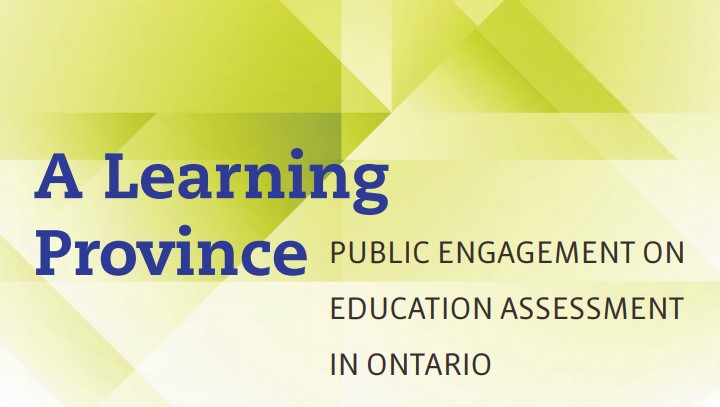Ontario considering changes to assessment and measurement
The province has instigated a review of assessment and reporting practices to “make sure educational assessments are culturally relevant, able to measure a wider range of learning, and better reflect equity and student well-being.” The review is examining measurement and assessment at the national and international, provincial and classroom levels.
The review team is seeking feedback from the public and stakeholders through an opinion poll, public consultations, and a submission process. The deadline for input is December 15. In March, the reviewers will provide the government with a report including recommendations for change.
Ontario students currently assessed at two levels:
- Provincially
- In Ontario, all students in grades 3, 6, 9 and 10 are tested every year in reading, writing and/or mathematics. The results of these EQAO tests are reported publicly – at the school, school board and provincial levels. Along with the tests, the EQAO surveys students, teachers and principals about everything from attitudes toward math, screen time, and school-community relations.
- In schools
- In classrooms across the province, students are assessed in a range of ways, from tests, to interviews, ongoing feedback, or self-report surveys. These assessments are used on an ongoing basis both to determine students’ accumulation of knowledge and/or skills and to understand the process of learning.
Both forms of assessment and measurement have multiple purposes, including things such as reporting to parents and/or the public, evaluating policy, for teachers to assess their own practices, and for students to understand their own learning.
Are changes needed in Ontario?
The discussion paper, A Learning Province / Public Engagement on Education Assessment in Ontario, outlines the scope of the review. By March of 2018, the reviewers are to provide:
- An evidence-informed review of the current model of assessment and reporting practices at the student, classroom, school, board, and provincial levels which examines its impact on learning, achievement, and well-being. This should include consideration of Indigenous educational assessments at the classroom, school, board, and system levels where language, culture, and land-based learning are part of well-being.
- A theory of action to support the best roles and uses of assessment and reporting at each level to inform various objectives including student learning. This should include consideration of the role of the learner.
- Evidence-informed and implementable recommendations for change based on the above.
- A more detailed set of recommendations regarding large-scale assessment practices, including a vision for the future. This should include consideration of:
- The grade levels to be assessed, taking into consideration the developmental stage of the learner and research on important outcomes or milestones
- The competencies to be assessed
- Timing of assessments
- Where assessments take place and who administers them
- The format of assessment (including technology and self-assessment)
- Equity, human rights, and cultural relevancy
- Feedback and reporting to students and parents/caregivers
- Appropriate uses of large-scale data at classroom, school, board, and provincial levels
- Participation in, and uses of, pan-Canadian and international assessments
Things to think about
- There is widespread agreement that students need more than a knowledge of reading, writing and math in order to be successful in the long run. Are there ways the province could assess students in areas such as creativity, social-emotional learning, citizenship or health – without simply adding more tests?
- Are results of provincial reading, writing and mathematics tests a good way to understand how well the system is doing overall?
- Opinion polls and international tests use a representative sample of the population to provide information to the public. Could we use a model like that in our schools – where a representative sample of students are tested in a range of areas including reading, writing and mathematics?
- Do students’ report cards give enough information about transferable skills such as creativity or citizenship?
- Are some forms of classroom assessment more important and/or effective than others?
- Do teachers currently have enough time and capacity to assess students in their classrooms and schools?
- Should we have a way of assessing not just student outcomes, but also what kinds of resources schools have access to?
To read People for Education’s Insight on Assessment, click here.
To participate in the provincial survey on assessment, click here.
To read the EQAO paper, Modernizing EQAO to Better Support Student Learning, click here.
